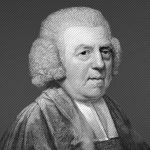Solomon advises us that there is nothing new under the sun. Indeed, in the history of Christian thought, one would expect that under the Lordship of Christ and his church, the essentials of the gospel would remain consistent over time. Thus, while they need repeating in every generation because slippage is always a threat, there remains a kind of harmony that exists among theologians who make the Bible first order. Likewise, as one dives into reading pastors and theologians from different eras and different places, one can expect to find echoes. Sometimes these are organically related, sometime they are not but cause for curiosity how it is possible that two statements made by independent thinkers could be so similar.
George Smeaton on Christ’s Universal Reign
Such an occasion happened a few months ago as I read George Smeaton’s eminently helpful book, The Doctrine of the Atonement As Taught By Christ Himself (Edinburgh, 1871) now retitled and republished as Christ’s Doctrine of the Atonement. In it, Smeaton gives his final exhortation from the text John 12:31, which reads, “Now is the judgment of this world: now shall the prince of this world be cast out.” In his thorough exegesis, the nineteenth-century Scot shows how Satan’s overthrow means simply, that Christ is the sole possessor of all things. He has stripped the god of this age of his title to this world, and he now rightly possesses the earth (cf. Matt 28:18). Therefore he writes,
This text [John 12:31], important in many aspects, is capable of being viewed in many applications. It throws a steady light on the great and momentous doctrine, that the world is, in consequence of the vicarious work of Christ, no more Satan’s, and that Christ’s people are now to be far from the impression that they are only captives in an enemy’s territory, and unable warrantably to occupy a place in the world, either as citizens or magistrates.
Moving from Christ’s substitutionary cross to the the universal themes of victory and dominion, Smeaton makes this final, global and glorious statement,
On the contrary, this testimony shows that every foot of ground in the world belongs to Christ, that His followers can be loyal to Him in every position, and that in every country and corner where they may placed they have to act their part for their Lord. The world is judicially awarded to Christ as its owner and Lord (p. 300).
This is a glorious truth that deserves time for consideration and meditation. Yet, in first hearing it, I could not help but think of Abraham Kuyper, who said something almost identical. Yet, as it will be shown, Kuyper’s context is different than Smeaton, and Kuyper actually spoke his word’s later.
Abraham Kuyper on Christ’s Universal Reign
In his lecture on “Sphere Sovereignty” delivered on October 20, 1880, Kuyper uttered what is today his most famous quotation. It reads:
There is not a square inch in the whole domain of our human existence over which Christ, who is Sovereign over all, does not cry: “Mine!“ (Abraham Kuyper, “Sphere Sovereignty,” in Abraham Kuyper: A Centennial Reader, ed. James D. Bratt [Grand Rapids: Eerdmans, 1998], 488).
In context, Kuyper’s statement comes at the end of a long list of academic sciences–medicine, law, natural science, letters– which the great educator of the Netherlands argued should be brought underneath the rule of Christ. Since all wisdom and knowledge are found in Christ (Col 2:3), all mental disciplines should find their origin and telos in Christ. In full context, he states,
Man in his antithesis as fallen sinner or self-developing natural creature returns again as the ‘subject that thinks’ or ‘the object that prompts thought’ in every department, in every discipline, and with every investigator. Oh, no single piece of our mental world is to be hermetically sealed off from the rest, and there is not a square inch in the whole domain of our human existence over which Christ, who is Sovereign over all, does not cry: ‘Mine!’ (488).
This concluding statement has been repeated again and again. It is a favorite of Reformed thinkers and others too. It is wonderful thought to realize that all things have been and should be put in submission to Christ. But interestingly the application of Kuyper’s words (as I have used them and have heard others use them) are slightly out of context.
Often Kuyper’s turn of phrase is used in spatial, geographical ways, as if he was explaining Psalm 2 which says that all the nations have been given to the Son. Since the Lord possesses all the earth, he has a right to put his finger on it and exlaim “Mine!” However, in context, Kuyper’s statement is more specific. He is speaking more exactly of the “mental world,” not the spatial world. I doubt he would deny the broader application, but to read Kuyper closely, we find that his statement is more narrow. This point does not mean that we need to abandon the use of Kuyper’s quote, so much as perhaps we should include Smeaton’s, too.
In the next post, we will pick up how and why we should incorporate Smeaton’s quotation into the discussion of Christ’s universal reign.




















